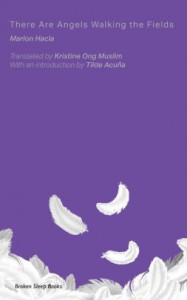This month, our selection of translated titles traverse the battlefield and the surfaces of paintings, lonely post-Communist apartment blocs and conservative spaces housing queer, radical instances of love. In language described by our editors and reviewers as potent, provocative, capacious, and full of longing, these four titles present an excellent pathway into the writers who are bringing the immediacies of experience into powerful socio-cultural commentary on our reality: Martin Hacla, Norman Erikson Pasaribu, Ramy Al-Asheq, and Monika Kompaníková.

There Are Angels Walking the Fields by Marlon Hacla, translated from the Filipino by Kristine Ong Muslim, Broken Sleep Books, 2021
Review by Shawn Hoo, Assistant Editor
Words happened. Cow became
Cow. The word milk gushed in every throat.
From this seemingly deflationary announcement that opens one of Marlon Hacla’s poems—“Words happened.”—an entire landscape is animated and given breath at the very juncture of utterance. Not only do ears of corn and a crown of birds begin to stir, so too does the speaker, finding himself transported by the magical properties of language: “I uttered the word joy / And I was once again playing a game / As a child with my friends.” Read as the collection’s ars poetica, we might say that in Hacla’s debut poetry collection, words do not simply refer to things. They move things, and each marks an occasion in the world; they sing the world into movement.
There Are Angels Walking the Fields—first published in 2010 under the Ubod New Authors Series by the National Commission for Culture and the Arts in the Philippines—opens with a lilting “Invocation,” its unbroken anaphora incanting the world of inanimate things (“In the name of the rock. In the name of the lily blossom”), of unarticulated desires (“In the name of burned / Letters from a concubine”) and of those who have been cast into the margins (“In the name of wives / Abandoned by their husbands. In the name of gay fathers”). Who could believe more in language’s ability to intervene in the world than the one who uses them in supplication? In opening the collection with this list, Hacla immediately throws his lot with the downtrodden and the forgotten—those who may not have the ability to speak—and soothes them with the divine balm of words. In her translator’s note, past contributor Kristine Ong Muslim justifies her sharpening of the poem’s decisiveness in order to heighten the quality of invocation. Thus, a line more literally translated as “In the name of hands / Not touched” becomes “In the name of hands / Never held.” Might we also consider the translator as one who practices the art of invocation—except rather than calling out in prayer, the translator calls inward, to be possessed by both languages? Where, in order for words to perform the magic of the original—for cow to become cow—something first has to happen to them? In Muslim’s translation, Hacla’s lines are screwed tight; each enjambment turns brutally, and every line sweats with a potent lyricism, as how this opening poem rollicks to an epiphany by the end:
[. . .] In the name of faces hidden.
By a black veil. In the names of ears
That had not known the sound of a violin. In the name of a flower
That bloomed in the morning and wilted by nightfall.
In your name, you who would someday die and fade away.

